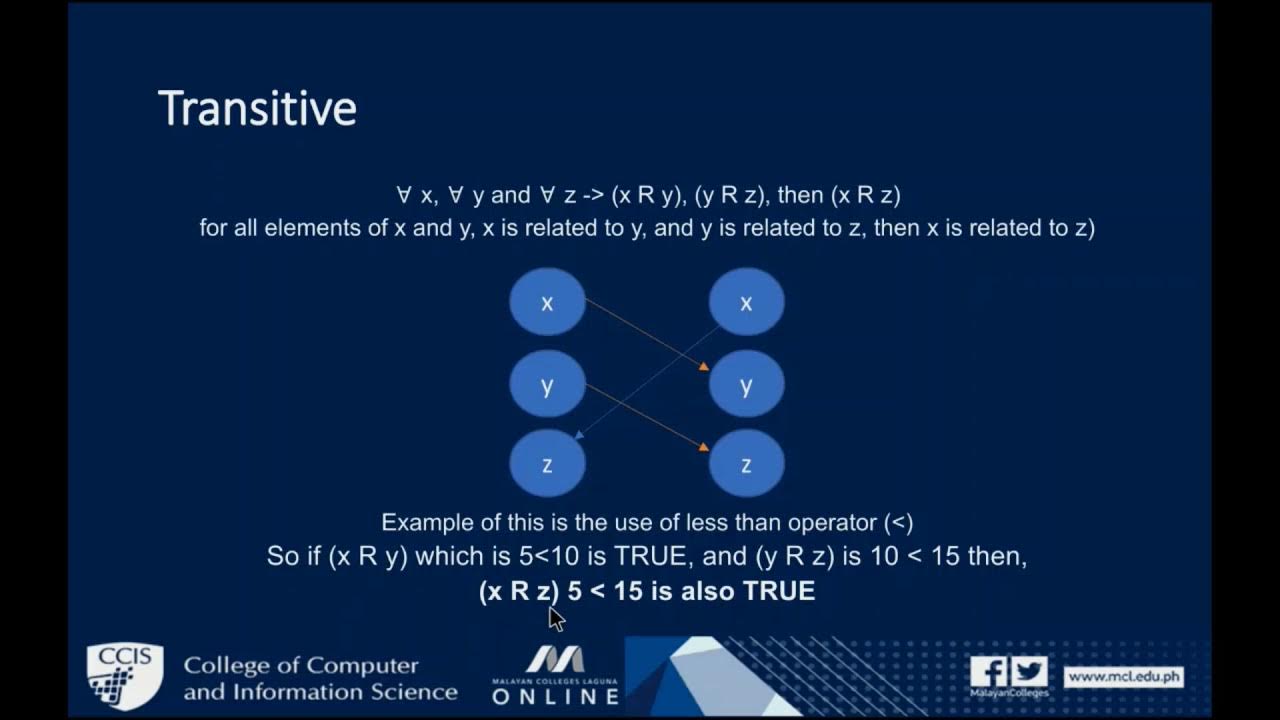Some Important Mathematical Statements || Mathematics in the Modern World
Summary
TLDRThis educational video delves into the language of mathematics, focusing on variables, sets, relations, and functions. It introduces three fundamental types of mathematical statements: universal, conditional, and existential. The video illustrates how these statements can be expressed in various forms and emphasizes the importance of variables in unambiguously referring to quantities throughout mathematical arguments. Exercises are provided to help viewers practice translating between different statement forms, enhancing their understanding of mathematical language.
Takeaways
- 📚 Start with a vague sense of how to approach a math problem and refine your thinking as you get closer to a solution.
- 🔍 Use examples, pictures, and notation to focus on the details of a problem.
- 💬 The clarity and precision of mathematical language are crucial as you approach a solution.
- 🔑 Learn the language of variables, sets, relations, and functions as a foundation for mathematical thought.
- 🌐 Understand three key types of mathematical statements: universal, conditional, and existential.
- 🔍 Universal statements assert that a property is true for all elements in a set, often using qualifiers like 'all', 'for every', or 'for each'.
- ➡️ Conditional statements express that if one thing is true, then another must also be true, using 'if...then...' structure.
- 🔎 Existential statements claim the existence of at least one element with a certain property, such as 'there is a prime number that is even'.
- 🔄 Recognize that universal conditional statements can be rewritten to emphasize either their universal or conditional nature.
- 🔄 Universal existential statements combine the universal and existential aspects, asserting a property is true for all objects and something exists that satisfies a condition.
- 🔄 Existential universal statements assert the existence of an object and that it satisfies a certain property for all things of a certain kind.
- 📝 Practice translating between everyday language and mathematical language using variables to express statements clearly and unambiguously.
Q & A
What are the three most important types of mathematical statements discussed in the video?
-The three most important types of mathematical statements discussed are universal statements, conditional statements, and existential statements.
What is a universal statement in mathematics?
-A universal statement is one that asserts a certain property is true for all elements in a set, such as 'all positive numbers are greater than zero.'
What does the word 'if' signify in a mathematical statement?
-In a mathematical statement, the word 'if' is a conditional qualifier, indicating that if one thing is true, then some other thing also has to be true.
Can you provide an example of an existential statement from the video?
-An example of an existential statement is 'there is a prime number that is even,' which is true because the number two is the only even prime number.
How can universal conditional statements be rewritten to emphasize their conditional nature?
-Universal conditional statements can be rewritten to emphasize their conditional nature by starting with 'if' and making the universal aspect implicit, such as 'if an animal is a dog, then the animal is a mammal.'
What is the significance of being able to translate between different expressions of universal conditional statements?
-The ability to translate between different expressions of universal conditional statements is enormously useful for doing mathematics and in many parts of computer science as it allows for clear and precise communication of mathematical ideas.
What does the term 'additive inverse' mean in the context of the video?
-In the context of the video, 'additive inverse' refers to a number that, when added to a given number, results in zero. For example, the additive inverse of 5 is -5.
How can existential universal statements be identified in mathematical language?
-Existential universal statements can be identified by their structure, which asserts the existence of an object (existential part) and then states a property that this object satisfies for all things of a certain kind (universal part).
Why is the use of variables in mathematics important according to the video?
-The use of variables in mathematics is important because it allows for unambiguous reference to quantities throughout a mathematical argument without restricting consideration to specific values.
What is the main purpose of exercises in the video regarding mathematical statements?
-The main purpose of exercises in the video is to help viewers become comfortable with translating between everyday language and the language of variables, which is crucial for expressing mathematical ideas clearly and precisely.
Outlines

This section is available to paid users only. Please upgrade to access this part.
Upgrade NowMindmap

This section is available to paid users only. Please upgrade to access this part.
Upgrade NowKeywords

This section is available to paid users only. Please upgrade to access this part.
Upgrade NowHighlights

This section is available to paid users only. Please upgrade to access this part.
Upgrade NowTranscripts

This section is available to paid users only. Please upgrade to access this part.
Upgrade NowBrowse More Related Video

Kurikulum Merdeka Matematika Kelas 8 Bab 4 Relasi dan Fungsi

Introduction to Function and Types of Function - Functions - Discrete Mathematics

Relasi & Fungsi (1) - Relasi, Pengertian Relasi, Contoh Relasi - Matematika SMP

Materi Matematika Kelas 8: Relasi dan Fungsi

FUNCTIONS | SHS GRADE 11 GENERAL MATHEMATICS QUARTER 1 MODULE 1 LESSON 1

CS101 2 Module 3 Relations and their Properties PART1
5.0 / 5 (0 votes)